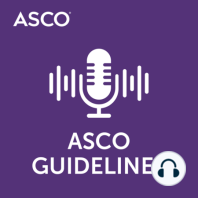15 min listen

Management of Advanced HER2-Positive Breast Cancer and Brain Metastases Guideline Update
FromASCO Guidelines
Management of Advanced HER2-Positive Breast Cancer and Brain Metastases Guideline Update
FromASCO Guidelines
ratings:
Length:
14 minutes
Released:
May 31, 2022
Format:
Podcast episode
Description
An interview with Dr. Naren Ramakrishna from Orlando Health Cancer Institute in Orlando, FL, and Dr. Carey Anders from Duke University in Durham, NC, co-chairs on "Management of Advanced Human Epidermal Growth Factor Receptor 2 Positive Breast Cancer and Brain Metastases: ASCO Guideline Update." This guideline reviews evidence in both the local therapy management and systemic therapy management for patients with HER2-positive breast cancer and brain metastasis, and provides updated recommendations for these patients. Read the full guideline at www.asco.org/breast-cancer-guidelines. TRANSCRIPT Brittany Harvey: Hello and welcome to the ASCO Guidelines Podcast series brought to you by the ASCO Podcast Network, a collection of nine programs covering a range of educational and scientific content and offering enriching insight into the world of cancer care. You can find all the shows including this one at asco.org/podcasts. My name is Brittany Harvey, and today I'm interviewing Dr. Naren Ramakrishna from Orlando Health Cancer Institute in Orlando, Florida. And Dr. Carey Anders from Duke University in Durham, North Carolina, co-chairs on 'Management of Advanced Human Epidermal Growth Factor Receptor 2 Positive Breast Cancer and Brain Metastases: ASCO Guideline Update'. Thank you for being here. Dr. Ramakrishna and Dr. Anders. Dr. Carey Anders: Thank you. Dr. Naren Ramakrishna: Thank you. Brittany Harvey: First, I'd like to note that ASCO takes great care in the development of its guidelines and ensuring that the ASCO conflict of interest policy is followed for each guideline. The full conflict of interest information for this guideline panel is available online with the publication of the guideline in the Journal of Clinical Oncology. Dr. Ramakrishna, do you have any relevant disclosures that are directly related to this guideline topic? Dr. Naren Ramakrishna: No. Brittany Harvey: And Dr. Anders, do you have any relevant disclosures that are directly related to this guideline topic? Dr. Carey Anders: I do. I would just like to disclose that I receive research funding, compensated consulting roles, and royalties from several of our industry partners who are developing brain permeable compounds. Brittany Harvey: Thank you. Let's talk about the content of this guideline. So, Dr. Anders, what prompted an update to this guideline? And what is the scope of this guideline update? Dr. Carey Anders: Thank you for that question, Brittany. Our previous guideline in the management of HER2-positive breast cancer brain metastasis was published in 2018. And since that time, we've seen significant progress in both the local therapy management and systemic therapy management for our patients with HER2-positive breast cancer and brain metastasis. I think collectively, this body of work really prompted the panel to think through the changes that we could make to improve the care of our patients taking these updates into account. I'd love to hear Dr. Ramakrishna’s take on the rationale for the update as he was also involved in the 2018 guideline. Dr. Naren Ramakrishna: Thank you, Carey. Well, it's really an exciting time right now for breast cancer brain metastasis treatment. And the recent data that Dr. Anders referred to has really opened up a whole new era in terms of therapeutic possibilities for breast cancer brain metastasis patients. In the past, we've relied on traditional methods of treatment like whole-brain radiotherapy, surgery, and stereotactic radiosurgery as mainstays of treatment. But this exciting data that Dr. Anders referred to, has resulted in the possibility of avoiding certain of the local therapy options in select patients, which has the potential to increase patient survival and quality of life, and is a major advancement. Brittany Harvey: Excellent. It's great to hear about those advancements. So, then next, I'd like to start by reviewing the guideline recommendations for our listeners. Dr. Ramakrishna, what are the key recomm
Released:
May 31, 2022
Format:
Podcast episode
Titles in the series (100)
Management of Immune-Related Adverse Events Guideline: An interview with Dr. Bryan Schneider of the University of Michigan on the ASCO clinical practice guideline to increase awareness, outline strategies, and offer guidance on the recommended management of immune-related adverse events in patients... by ASCO Guidelines